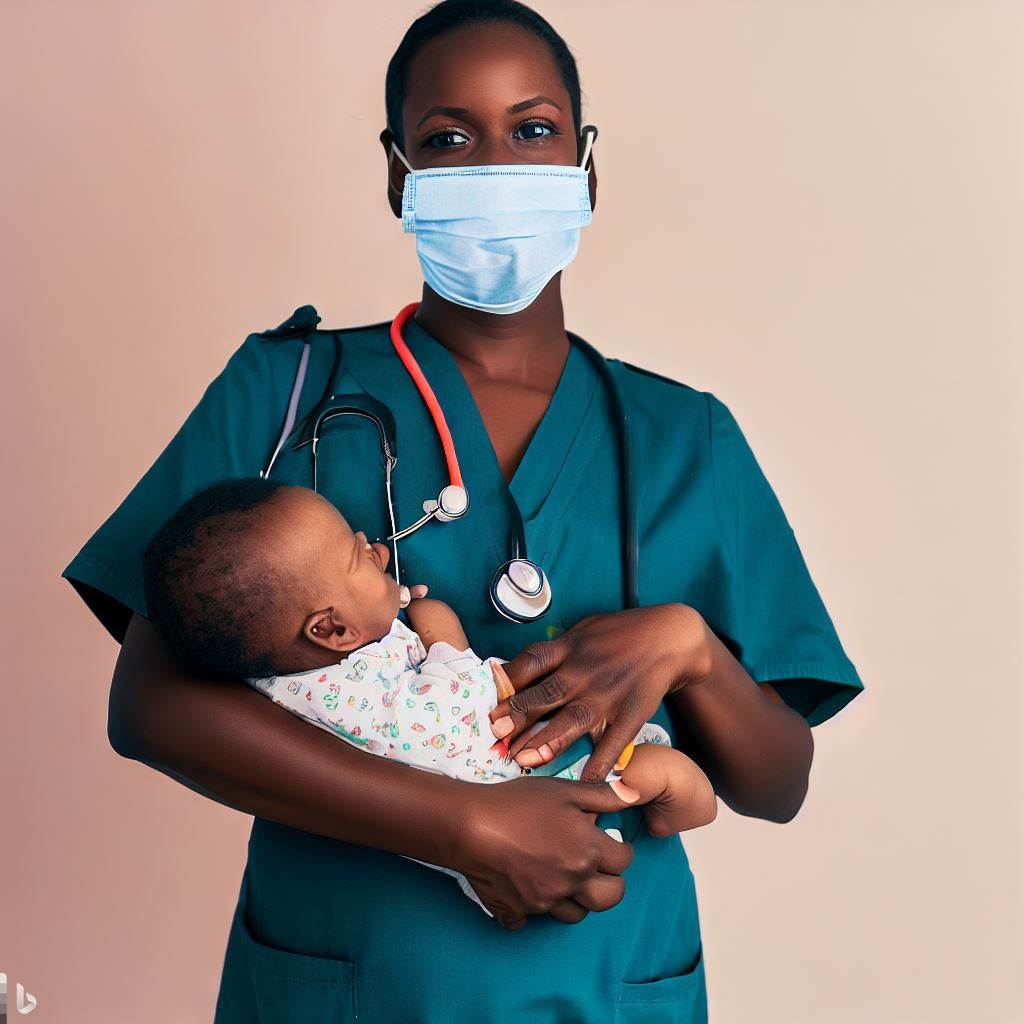Introduction
Becoming a Nurse Midwife in Nigeria plays a vital role in healthcare, offering specialized care to women throughout pregnancy, childbirth, and postpartum.
Nurse midwives are indispensable in ensuring safe deliveries, providing prenatal and postnatal care, and supporting women’s reproductive health.
The journey of becoming a nurse midwife in Nigeria is both rewarding and challenging, demanding dedication, education, and practical experience.
To become a nurse midwife in Nigeria, aspiring individuals must pursue a dedicated path.
First, they must complete a Bachelor of Science in Nursing (BSN) degree, equipping them with fundamental nursing knowledge.
Subsequently, they must gain clinical experience as registered nurses, preferably in obstetrics or gynecology settings.
After gaining experience, aspiring nurse midwives must pursue a master’s degree or a postgraduate diploma in midwifery.
This advanced education focuses on specialized topics like antenatal care, labor management, and neonatal health.
During their studies, aspiring nurse midwives gain hands-on experience through clinical placements, preparing them for real-world challenges.
Once their education is complete, they must obtain certification from the Nursing and Midwifery Council of Nigeria to practice legally.
This certification recognizes their competence in providing quality care to expectant mothers and their infants.
In general, the journey of becoming a nurse midwife in Nigeria is a fulfilling and demanding process.
With dedication, education, and practical experience, these healthcare professionals contribute significantly to women’s well-being during the critical phases of pregnancy and childbirth.
Read: Trends in Nigerian Nursing: Technological Advances
The education and training required to become a nurse midwife in Nigeria
In order to become a nurse midwife in Nigeria, individuals must undergo a specific education and training process. This section will outline the necessary steps to pursue this career path.
Obtaining a nursing degree
- Enrolling in a nursing school is the first and most crucial step towards becoming a nurse midwife.
- Completing both theoretical and practical coursework is essential for gaining a comprehensive understanding of nursing.
Specializing in midwifery
- Pursuing additional midwifery training is necessary to become a qualified nurse midwife.
- Participating in clinical rotations and gaining hands-on experience in midwifery is vital for learning the practical aspects of the profession.
Acquiring necessary certifications and licenses
- Passing the Nursing and Midwifery Council of Nigeria (NMCN) exam is a requirement to practice as a nurse midwife.
- After passing the exam, individuals must register with the NMCN as a certified midwife to gain official recognition.
In summary, the journey of becoming a nurse midwife in Nigeria involves obtaining a nursing degree, specializing in midwifery through additional training and hands-on experience, and acquiring the necessary certifications and licenses.
It is a rigorous process aimed at ensuring that qualified professionals are able to provide quality care to women and infants during childbirth.
Read: Exploring Job Opportunities for Nurses in Nigeria
Challenges faced during the journey of becoming a nurse midwife in Nigeria
Becoming a nurse midwife in Nigeria is a challenging journey, marked by various hurdles that aspiring professionals must overcome.
Limited access to quality education and training programs
This section explores the challenges faced during this journey, shedding light on the limited access to quality education and training programs, financial constraints, and gender-related obstacles.
One of the significant challenges faced by individuals in Nigeria aspiring to become nurse midwives is the limited access to quality education and training programs.
Particularly in remote areas, there is an insufficient number of nursing schools.
This scarcity prevents many individuals from pursuing their dreams and obtaining the necessary education to become competent nurse midwives.
In addition to the shortage of nursing schools, aspiring nurse midwives often face inadequate resources and facilities for practical training.
Limited equipment and outdated training methods hinder the development of necessary skills and knowledge.
The absence of hands-on experience can impact the competency and preparedness of future nurse midwives, compromising the quality of care they can provide.
Financial constraints and affordability of education
Another significant challenge on the journey to becoming a nurse midwife in Nigeria is the financial burden associated with education.
The high costs of tuition, textbooks, and other related expenses can be prohibitive for many aspiring nurse midwives. This financial barrier prevents individuals from pursuing their passion and achieving their educational goals.
Furthermore, limited scholarship opportunities add to the financial constraints faced by aspiring nurse midwives.
Financial assistance options specifically tailored to support nursing or midwifery education are scarce.
Without access to scholarships, many deserving individuals are unable to afford the necessary education and training to become nurse midwives.
Gender-related obstacles in healthcare professions
Gender-related obstacles also pose challenges for individuals aspiring to become nurse midwives in Nigeria.
Societal expectations and norms often discourage women from pursuing careers in nursing and midwifery. These gender biases undermine female aspirations, perpetuating the notion that these professions are not suitable or prestigious enough for women.
Discrimination and gender bias in the workplace further compound the challenges faced by female nurse midwives.
Women may face unequal treatment, limited advancement opportunities, and biases in hiring decisions.
Overcoming these obstacles requires female nurse midwives to be resilient, determined, and constantly challenge societal norms and biases.
In fact, the journey of becoming a nurse midwife in Nigeria is fraught with numerous challenges. Limited access to quality education and training programs, financial constraints, and gender-related obstacles all contribute to the difficulties faced by aspiring professionals.
Addressing these challenges requires proactive measures to improve access to education, provide financial assistance, and challenge gender biases in healthcare professions.
Read: Continuing Education for Nurses: Options in Nigeria

Rewards and opportunities of being a nurse midwife in Nigeria
Making a significant impact on maternal and child healthcare
- Ensuring safe childbirth and reducing maternal mortality rates.
- Providing essential prenatal and postnatal care to mothers.
Interacting with diverse patients and communities
- Building relationships with women from different backgrounds.
- Promoting cultural competency and understanding.
Professional growth and advancement
- Opportunities for specialization and further education.
- Contributing to research and policy-making in the field.
Becoming a Nurse Midwife in Nigeria presents numerous rewards and opportunities.
These healthcare professionals play a vital role in enhancing maternal and child healthcare, making a significant impact on women and families.
A major reward is ensuring safe childbirth and reducing maternal mortality rates. Nurse midwives provide skilled care during labor and delivery, saving countless lives and minimizing childbirth risks.
They also offer essential prenatal and postnatal care, monitoring pregnant women’s health, educating them on nutrition, and supporting them during the postpartum period, promoting well-being for both mother and baby.
Another rewarding aspect is interacting with diverse patients and communities, building trust and delivering culturally sensitive care, fostering understanding and respect among different cultures.
Professional growth is abundant, with opportunities for specialization in maternal and child healthcare areas and access to further education and training programs to enhance skills and knowledge.
Additionally, nurse midwives can contribute to research and policy-making, providing valuable insights to improve healthcare services.
In short, being a nurse midwife in Nigeria is a fulfilling career that positively impacts maternal and child healthcare, promoting safe childbirth experiences and shaping the nation’s healthcare future.
Read: Top Universities for Nurse Midwife Studies in Nigeria
Conclusion
Embarking on the path of becoming a nurse midwife in Nigeria is a transformative journey filled with challenges and rewards.
From the early days of rigorous training to gaining essential clinical skills, the process is an empowering one that shapes compassionate and competent healthcare professionals.
The significance of supporting and empowering aspiring nurse midwives cannot be overstated.
Providing them with access to quality education, mentorship, and resources will not only enhance their capabilities but also contribute to improving maternal and neonatal healthcare in the country.
Empowered nurse midwives play a crucial role in reducing maternal mortality rates and ensuring safe childbirth practices.
To all those contemplating a career in nurse midwifery in Nigeria, embrace the journey with determination and passion.
Your dedication will impact countless lives and foster a healthier future for mothers and infants. Despite the challenges, remember that your contribution to maternal health is invaluable, and you hold the power to make a significant difference.
Pursue your dream of becoming a nurse midwife, and let your compassion and skills create a positive impact on society.




